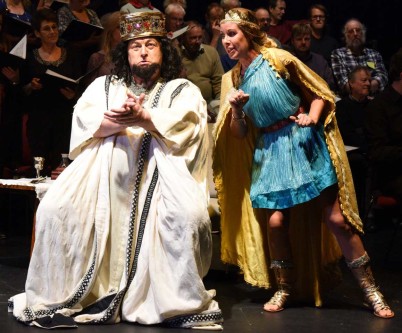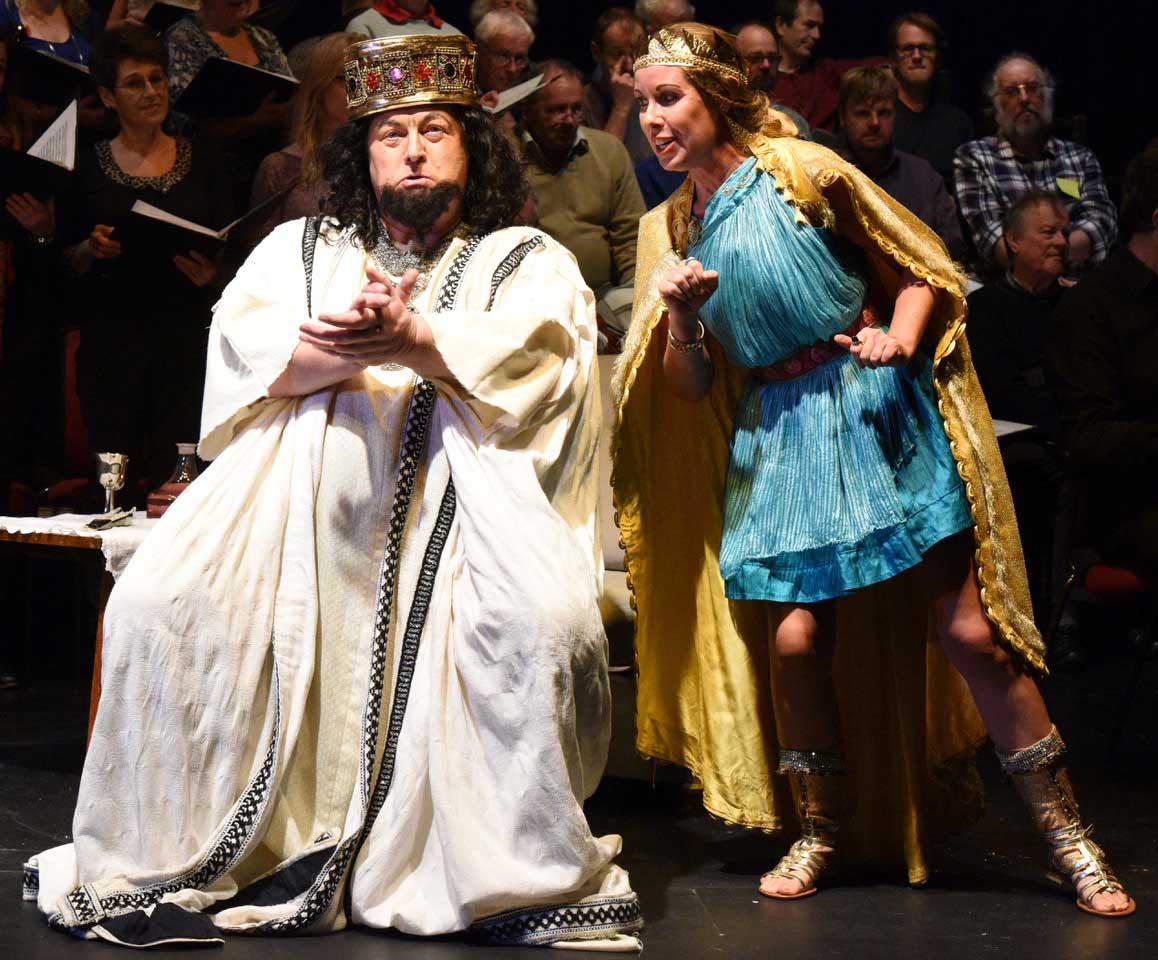 United Kingdom Jacques Offenbach, La belle Hélène (in English): Soloists, Kentish Opera Chorus and Orchestra / Robyn Sevastos (conductor), The Stag Theatre, Sevenoaks, 29.10.2017 (MH)
United Kingdom Jacques Offenbach, La belle Hélène (in English): Soloists, Kentish Opera Chorus and Orchestra / Robyn Sevastos (conductor), The Stag Theatre, Sevenoaks, 29.10.2017 (MH)

© Andrew Waltham
Cast:
Helen – Stefanie Kemball-Read
Orestes – Lindy Everett
Paris – Tristan Stocks
Menelaus – Daniel Meades
Agamemnon – Ian Belsey
Calchas – Graham Stone
Achilles – Georg Tormann
Ajax 1 – Edmund Henderson
Ajax 2 – Gary Feltham
Bacchus – Rebecca Foster
Young Girl – Pauline Flanagan
Young Girl – Becka Hooper
Production:
Costume Designer – Carol Stevenson
Lighting Designers – Colin Martin, Edward Palmer
A rare opportunity in the UK to hear and see one of Offenbach’s comic operettas made an Autumnal treat. The original was first produced in Paris in 1864 and later titled Helen or Taken from the Greek – in the London premiere of 1866. A light hearted musical offering based on the mythical story of Helen – the beautiful wife of King Menelaus and her dalliance with Paris – son of the King of Troy. A truly rumbustious French romp through the world of Greek mythology with familiar, hummable tunes.
The evening was advertised as a Concert performance, but in fact was semi staged with linking narration to good effect. The occasional use of scores did not detract from the overall theatrical experience.
The staging was essentially simple with chorus seated upstage and the 20 piece orchestra onstage left, with centre and stage right areas dressed with simple furniture and properties. All the principals appeared in Costume which was suitably period Greek, albeit theatrically glamorous and colourful. The chorus, though fixed in position, were clearly involved in the plot, singing with clarity and full tone from the start, particularly creditable in the first Allegro vivace sections.
The title role of Helen was taken by Stefanie Kemble-Read, who made a believable, unfaithful consort to King Menelaus (Daniel Meades). She appeared in a variety of suitably glamorous costumes and her early, popular aria Amour devins – O Gods of Love in celebration of the Feast of Adonis, showed off a bright vocal presence. There were times during the evening when the onstage orchestra rather overpowered some of her lower register, which was unfortunate. In Act II, attired in negligee, her romp with Paris was inevitable, having convincingly sought the council of Venus – Dis moi Vénus. Left alone with the youthful Paris (Tristan Stocks), their “Dream” duet was delightful – Oui c’est une rêve; both voices complementing each other in timbre and emotional intensity. Stocks’ high English tenor had already been heard to good effect in the well known Judgement of Paris aria – Au mont Ida, where his repetitive top notes were taken with impressive ease. Sadly again, balance issues were evident in this aria when jumping from low to high register within a bar; a difficult feature of Offenbach’s score. However, in the finale to Act II there were audience pleasing, high tessitura sections, where true tenor bravura was employed to great effect in the ‘I’ll be back’ moment.
Calchas, the High Priest of Jupiter (Graham Stone) and King Agamemnon (Ian Belsey) were a well matched, experienced duo, both vocally and in comic timing; relishing the humour of the piece and displaying their professionalism in putting over this semi staged version. Particularly enjoyable was the linking narration from Belsey. His rapport with the audience and cast, reminiscent of pantomime, certainly added to the joi de vivre. His scripted clarification of the plot with asides gave a memorable bewhiskered portrayal. Stone made a good opera seria character of Calchas and his secure baritone was a pleasure, particularly when anchoring the ensemble numbers in the finale Act II and Tyrollienne – Act III.
Menelaus (Daniel Meades) was a suitably outraged monarch and sang with confident tenorial fortitude, notable in ensembles where his line was never overwhelmed, helping to bring out important aspects of the complicated libretto.
The trousers role of Orestes, sung by Lindy Everett was one of several Comprimario roles. Elegantly costumed, her Act II Couplet – There is nothing like wine and roses gave a chance for her to display her mellow toned soprano, which was also consistently clear during the ensembles.
Of the other minor roles, all well taken, the most notable was Bacchus, not seen in Offenbach’s original scoring. Here sung with ringing clarity by Rebecca Foster. This was a strong soprano voice, which would be good to hear in a more substantial role. Completing the ensemble with a clear, confident tenor performance was Achilles (Georg Tormann).
Finally, Robyn Sevastos as musical director was very active in her control of orchestra and singers, though, as mentioned, balance was occasionally an issue. Particularly enjoyable was the Overture with good ensemble, once the initial Allegro settled and eminently hummable waltzes followed. The three accelerating, final Allegro sections were really exhilarating. Here it was good to see the orchestra sweating, whilst giving a taste of the audible pleasure to come!
This is a provincial opera group with professional soloists, Orchestra and Community ensemble presenting opera to a high standard; showing just what can be achieved outside the London metropolis. It would be good to see a fully staged version of this cheeky Offenbach operetta. Fortunately, Kentish Opera will be fully staging their 2018 production of Cavalleria rusticana & I Pagliacci.
Martyn Harrison
